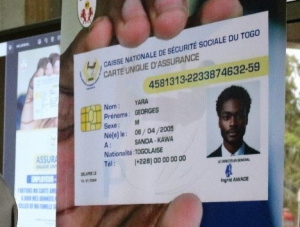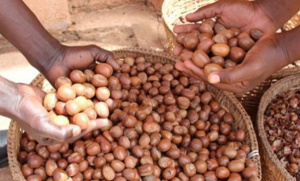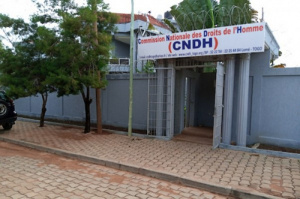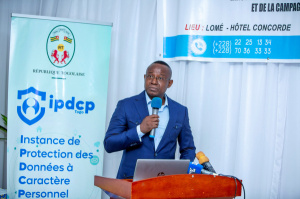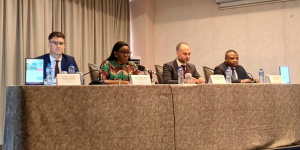Togo First
Togo: 12,000 Universal Health Insurance Cards Ready for Collection
Togo's National Social Security Fund (CNSS) urges beneficiaries to collect their Universal Health Insurance (AMU) cards. The CNSS issued 12,000 cards months ago, including 11,500 for active insured and 541 for retirees.
"These cards are essential to guarantee fast and efficient access to care, " the CNSS Director General, Ingrid Awadé, said a week ago.
The Security Fund notes that even if their employers are absent, insured citizens can still withdraw their cards by providing valid identification.
The CNSS expanded its network to improve AMU coverage, with new regional desks in Atakpamé and Kara. Mobile units have also been deployed to remote areas. Special counters have been set up at the Fund’s headquarters to handle emergencies, past agreements, and chronic pathologies.
The INAM manages AMU for the public sector, while the CNSS oversees the private sector.
This article was initially published in French by Ayi Renaud Dossavi
Edited in English by Ola Schad Akinocho
Togo to Host Debt Sustainability Conference in Lomé in May
Lomé will host an African Union (AU) conference on public debt from May 12 to 14, 2025. The event’s central theme is “Africa’s Public Debt Management Programme: Restoring and Preserving Debt Sustainability.” It is organized by the AU Commission’s Economic Development, Tourism, Trade, Industry, and Minerals Department (ETTIM).
Representatives from AU Member States, African central banks, regional economic communities, finance ministries, multilateral institutions, and civil society organizations will participate. Policy-makers and financial experts are also expected.
Together, they will explore collaborative solutions to the African debt puzzle. One of the conference’s top goals is to revise the common African stance on global financial architecture reforms to ease the continent’s debt crisis. The conference will also explore innovative financing mechanisms and recommend practices for mobilizing funds while ensuring sustainability.
The event aims to define principles for sound public debt management and propose policy reforms to secure long-term financial stability for African nations.
The Togolese capital, Lomé, will serve as a platform for redefining debt strategies and strengthening economic resilience against global financial shocks. These discussions align with broader efforts to guarantee sustainable growth across the continent.
This article was initially published in French by Esaïe Edoh
Edited in English by Ola Schad Akinocho
Togo Suspends Shea Nut Exports to Boost Local Processing
Togo has temporarily ceased exporting shea nut and shea kernel. The ministries of Trade, Economy, and Agriculture made the call, in a bid to tackle the shortage of input needed by local processors.
While the country has 10 processing units, its annual output–40,000 tonnes–is insufficient to meet the facilities’ demand. For example, major players like NIOTO and Label d'Or can respectively process 35,000 and 10,000 tonnes of shea kernels yearly.
On average, Togo exports 25,000 tonnes of shea per year. This is about 5% of West African exports. President Gnassingbé’s country is the world’s seventh-largest shea producer. A laudable performance, but the local processing industry lacks the input to expand.
Lomé stopped exports as part of its industrialization strategy. The document aims to boost local production and processing capacity to capture more value and reduce dependence on external markets.
This article was initially published in French by Esaïe Edoh
Edited in English by Ola Schad Akinocho
UN Confirms Togo's National Human Rights Commission as Top Institution
The United Nations Sub-Committee on Accreditation has reaccredited Togo's National Human Rights Commission (CNDH) with 'A' status as a National Human Rights Institution (NHRI). The decision was made official on March 25, 2025, after a review in Geneva, Switzerland, on March 18.
This reaccreditation confirms that the CNDH meets the Paris Principles, which demand independence, impartiality, and effectiveness from national human rights bodies. These principles, set by the UN General Assembly in 1993, define how such institutions should promote and protect fundamental rights.
'A' status is the highest recognition for national human rights institutions. It highlights the CNDH's work since its founding in 1987 to advance human rights and strengthen the rule of law. The commission first earned this distinction in 2000 and has maintained it ever since. This status gives CNDH a strong voice in the Global Alliance of NHRIs and allows active participation in international and regional human rights mechanisms. It also boosts its credibility with donors and technical partners who value this recognition.
The reaccreditation reinforces the CNDH’s commitment to its mission. The commission pledges to continue promoting fundamental rights for Togolese citizens and authorities.
The CNDH monitors Togo’s adherence to international human rights obligations alongside UN bodies.
This article was initially published in French by Esaïe Edoh
Edited in English by Ola Schad Akinocho
Togo: Power Utility Warns of Potential Power Cuts Until April 15
The Togolese power utility–Compagnie énergie électrique du Togo (CEET)-has extended maintenance works at one of the country’s thermal power stations. Initially set to end on March 25, the works have been extended to April 15. While announcing the extension, the CEET warned of potential power cuts until the maintenance is over.
The utility attributed the extension to the need for additional technical works. The CEET said these works would ensure the optimal operation of the plant and help maintain a reliable electricity supply.
Authorities have taken measures to mitigate the anticipated power cuts. Similar to previous months, backup plans include importing additional electricity. Last month, during the temporary shutdown of the gas pipeline, Togo used liquid fuels to power thermal plants and increased imports, adding up to 35 MW to the grid.
This article was initially published in French by Esaïe Edoh
Edited in English by Ola Schad Akinocho
Togo: National Data Protection Authority Launches
The Personal Data Protection Authority (IPDCP) of Togo officially launched on March 28, 2025. Various representatives from the government and public agencies, as well as media workers, attended the launching ceremony in Lomé, the capital.
"The role of the IPDCP is essential in building a digital space of trust, where citizens, businesses, and institutions can evolve serenely, in complete security," said Bédiani Béléi, Chairman of the IPDCP. He also pledged that the authority would "ensure that information and communication technologies do not threaten individual freedoms and privacy."
The IPDCP has rolled out a public awareness campaign starting April 1. The campaign aims to inform Togolese citizens about their rights and the mechanisms available to protect their personal data from exploitation.
This article was initially published in French by Octave A. Bruce
Edited in English by Ola Schad Akinocho
Osaka 2025 World Expo: Togo Opens Registration
Togolese businesses can now apply to participate in the Osaka 2025 World Expo, set to run from April 13 to October 13. The event will bring together 160 countries and nine international organizations.
On March 28, the Ministry of Industry and Investment Promotion, in collaboration with the Togo Chamber of Commerce and Industry (CCI-T), hosted an information session to announce the opportunities available at the expo. These include B2B meetings, thematic panels, and innovation showcases designed to help Togolese companies build strategic partnerships and access new markets.
Urging local businesses to attend the event, Alexandre de Souza, Togo’s Commissioner General for the expo, said: “Your participation in this global event is a unique opportunity to forge strategic partnerships and show the world that Togo is a country of the future, where innovation and inclusion go hand in hand.”
José Kwassi Symenouh, President of CCI-Togo, highlighted the expo’s significance as a platform for economic players to display their expertise and enhance their competitiveness internationally.
Togo’s presence at Osaka 2025 will feature three major events: Economic Day on August 19, Cultural Day on August 20, and Togo National Day on August 21. Under the "Saving Lives" section, Togo will present its thematic focus on "Social Inclusion and Protection Policy for Strong Economic Growth."
This article was initially published in French by Gautier Agbékodovi
Edited in English by Ange Jason Quenum
Togo: Private Sector Contributed 76.8% of GDP in 2024
The Togolese private sector contributed 76.8% of the national GDP last year, down from 77.1% the year before. The figures were shared on March 28 in Lomé, during the State-Private Sector Technical Consultation Committee meeting.
Essowè Georges Barcola, Minister of Economy and Finance, praised private companies for generating nearly 98% of jobs in Togo. "The private sector’s ability to innovate and propose solutions makes it central to our economic resilience," he said.
A government-private sector tax dialogue
A key outcome of the meeting was the announcement of a structured fiscal dialogue between the government and the private sector ahead of the 2026 budget process. The dialogue aims to align both sides’ views on taxation and boost the private sector’s support for budgetary decisions. Planned actions include workshops on agricultural taxation, accounting training, and SME promotion initiatives.
Recommendations from the private sector
Private sector representatives welcomed the initiative at the meeting. Yva Badohoun, speaking on behalf of the private sector, outlined seven key recommendations to improve Togo’s business climate and foster inclusive economic growth.
Badohoun’s proposals include clarifying tax rules for imported software, reassessing taxes on telecommunications and ICT companies (TETIC), and activating the CAR and CARLD commissions to ensure swift and fair tax arbitration. He also emphasized appointing commission members with an operational timetable by June 2025 and simplifying customs procedures to cut costs and delays in commercial activities.
This article was initially published in French by Ayi Renaud Dossavi
Edited in English by Ange Jason Quenum
Togo Launches Digital Trade Portal to Simplify Cross-Border Trade
On March 27, 2025, Togo officially launched the Togo Trade Portal, a digital platform designed to facilitate trade by simplifying administrative procedures for cross-border goods and services. The Ministry of Trade, with technical support from the International Trade Centre (ITC), developed this tool to centralize regulations and procedures.
Streamlining Trade Processes
The portal, accessible at www.togotrade.gouv.tg, aims to simplify import and export procedures by providing transparent access to necessary licenses, permits, and certificates, particularly for 12 priority products. Pierre Bentonou, Head of Trade Facilitation at ITC, notes that this initiative makes trade formalities more understandable, which is crucial for small and medium-sized enterprises (SMEs) often hindered by complex procedures.
Enhancing Business Environment
Trade Minister Rose Kayi Mivedor emphasizes that the portal is part of Togo's strategy to digitalize its economy, which will improve the country's performance in international rankings, such as the World Bank's Business Ready program. The portal was developed under the Program for the Promotion of Private Sector Competitiveness in Togo (ProComp), funded by Germany and the European Union and implemented by GIZ.
This article was initially published in French by Ayi Renaud Dossavi
Edited in English by Ange Jason Quenum
Greater Lomé: Local Authorities Set Up Special Police Force for Bus Stations
In Greater Lomé, authorities have set up a special police station to secure bus stations and restore order. Inaugurated on March 26, 2025, by the Minister of Security and Civil Protection, Calixte Batossie Madjoulba, the station is located in Golfe 5.
The new station will strengthen police presence, combat illegal migration, and dismantle informal bus stations in the region. With public transport rapidly growing in Lomé, crime levels rose as well. This new facility addresses safety challenges and ensures compliance with regulations while monitoring passenger and goods flow.
The station features a reception desk, an administrative office, and two divisions for interventions and investigations. It aims to rebuild user trust by guaranteeing security and eliminating illegal practices.
"Bus stations once symbolized development, but have become hotspots for lawlessness. This police station restores order and provides users with a safe environment," said Akatao Babarime, Director General of the National Police.
For local authorities, setting up the new police station is a step toward safer urban mobility and better transport oversight.

